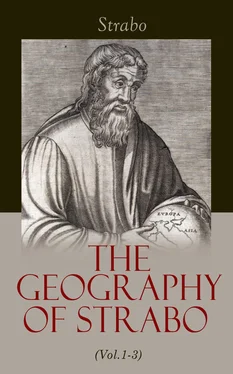3. Next in order after Latium is Campania, which extends along the [Tyrrhenian] Sea; above it is Samnium, in the interior, extending as far as the Frentani and Daunii; and beyond are the Daunii, and the other nations as far as the Strait of Sicily. We shall in the first place speak of Campania. From Sinuessa 1955to Misenum 1956the coast forms a vast gulf; beyond this is another gulf still larger, which they name the Crater. 1957It is enclosed by the two promontories of Misenum and the Athenæum. 1958It is along the shores of these [two gulfs] that the whole of Campania is situated. This plain is fertile above all others, and entirely surrounded by fruitful hills and the mountains of the Samnites and Osci. Antiochus says that this country was formerly inhabited by the Opici, and that these were called Ausones. Polybius appears to consider these as two people, for he says that the Opici and Ausones inhabit the country around the Crater. 1959Others, however, state that it was originally inhabited by Opici and Ausones, but was afterwards seized on by a nation of the Osci, who were driven out by the Cumæi, and these again by the Tyrrheni. Thus the possession of the plain was much disputed on account of its great fertility. [They add that the Tyrrheni] built there twelve cities, and named the metropolis Capua. But luxury having made them effeminate, in the same way that they had formerly been driven from the banks of the Po, they were now forced to abandon this country to the Samnites; who in their turn fell before the Romans. One proof of the fertility of this country is, that it produces the finest corn. I allude to the grain from which a groat is made superior to all kinds of rice, and to almost all other farinacious food. They say that some of the plains are cropped all the year round; twice with rye, the third time with panic, and occasionally a fourth time with vegetables. It is likewise from hence that the Romans procure their finest wines, the Falernian, the Statanian, and the Calenian. That of Surrentum 1960is now esteemed equal to these, it having been lately discovered that it can be kept to ripen. In addition to this, the whole country round Venafrum, bordering on the plains, is rich in olives.
4. The maritime cities [of Campania], after Sinuessa, are Liternum, 1961where is the sepulchral monument of the first of the two Scipios, surnamed Africanus; it was here that he passed the last days of his life, having abandoned public affairs in disgust at the intrigues of certain opponents. A river of the same name 1962flows by this city. In like manner the Vulturnus bears the same name as the city 1963founded on it, which comes next in order: this river flows through Venafrum 1964and the midst of Campania. After these [cities] comes Cumæ, 1965the most ancient settlement 1966of the Chalcidenses and Cumæans, for it is the oldest of all [the Greek cities] in Sicily or Italy. The leaders of the expedition, Hippocles the Cumæan and Megasthenes of Chalcis, having mutually agreed that one of the nations should have the management of the colony, and the other the honour of conferring upon it its own name. Hence at the present day it is named Cumæ, while at the same time it is said to have been founded by the Chalcidenses. At first this city was highly prosperous, as well as the Phlegræan 1967plain, which mythology has made the scene of the adventures of the giants, for no other reason, as it appears, than because the fertility of the country had given rise to battles for its possession. Afterwards, however, the Campanians becoming masters 1968of the city, inflicted much injustice on the inhabitants, [Pg 362] [CAS. 243] and even violated their wives. Still, however, there remain numerous traces of the Grecian taste, their temples, and their laws. Some are of opinion that Cumæ was so called from τὰ κύματα, the waves, the sea-coast near it being rocky and exposed. These people have excellent fisheries. On the shores of this gulf there is a scrubby forest, extending over numerous acres of parched and sandy land. This they call the Gallinarian 1969wood. It was there that the admirals of Sextus Pompeius assembled their gangs of pirates, at the time when he drew Sicily into revolt. 1970
5. Near to Cumæ is the promontory of Misenum, 1971and between them is the Acherusian Lake, 1972which is a muddy estuary of the sea. Having doubled Misenum, you come to a harbour at the very foot of the promontory. After this the shore runs inland, forming a deeply indented bay, on which are Baïæ and the hot springs, much used, both as a fashionable watering-place, and for the cure of diseases. Contiguous to Baïæ is the Lucrine Lake, 1973and within this the Lake Avernus, 1974which converts into a peninsula the land stretching from the maritime district, situated between it and Cumæ, as far as Cape Misenum, for there is only an isthmus of a few stadia, across which a subterraneous road is cut [from the head of the gulf of Avernus] to Cumæ and the sea [shore] on which it stands. Former writers, mingling fable with history, have applied to Avernus the expressions of Homer in his Invocation of Departed Spirits, 1975and relate that here formerly was an oracle of the dead, 1976and that it was to this place that Ulysses came. However, this gulf of Avernus is deep even near the shore, with an excellent entrance, and is both as to its size and nature a harbour; but it is not used, on account of the Lucrine Gulf which lies before it, and is both large and somewhat shallow. The Avernus is surrounded with steep hills which encompass the whole of it, with the exception of the entrance. These hills, now so beautifully cultivated were formerly covered with wild forests, gigantic and impenetrable, which overshadowed the gulf, imparting a feeling of superstitious awe. The inhabitants affirm that birds, flying over the lake, fall into the water, 1977being stifled by the vapours rising from it, a phenomenon of all Plutonian 1978localities. They believed, in fact, that this place was a Plutonium, around which the Kimmerians used to dwell, and those who sailed into the place made sacrifice and propitiatory offerings to the infernal deities, as they were instructed by the priests who ministered at the place. There is here a spring of water near to the sea fit for drinking, from which, however, every one abstained, as they supposed it to be water from the Styx: [they thought likewise] that the oracle of the dead was situated some where here; and the hot springs near to the Acherusian Lake indicated the proximity of Pyriphlegethon. Ephorus, peopling this place with Kimmerii, tells us that they dwell in under-ground habitations, named by them Argillæ, and that these communicate with one another by means of certain subterranean passages; and that they conduct strangers through them to the oracle, which is built far below the surface of the earth. They live on the mines together with the profits accruing from the oracle, and grants made to them by the king [of the country]. It was a traditional custom for the servants of the oracle never to behold the sun, and only to quit their caverns at night. It was on this account that the poet said,
“On them the Sun
Deigns not to look with his beam-darting eye.” 1979
At last, however, these men were exterminated by one of the kings, the oracle having deceived him; but [adds Ephorus] the oracle is still in existence, though removed to another [Pg 364]
[CAS. 245] place. Such were the myths related by our ancestors. But now that the wood surrounding the Avernus has been cut down by Agrippa, the lands built upon, and a subterranean passage cut from Avernus to Cumæ, all these appear fables. Perhaps 1980Cocceius, who made this subterranean passage, 1981wished to follow the practice of the Kimmerians we have already described, or fancied that it was natural to this place that its roads should be made under-ground.
Читать дальше












![Anne Blunt - A Pilgrimage to Nejd, the Cradle of the Arab Race. Vol. 2 [of 2]](/books/750183/anne-blunt-a-pilgrimage-to-nejd-the-cradle-of-the-thumb.webp)